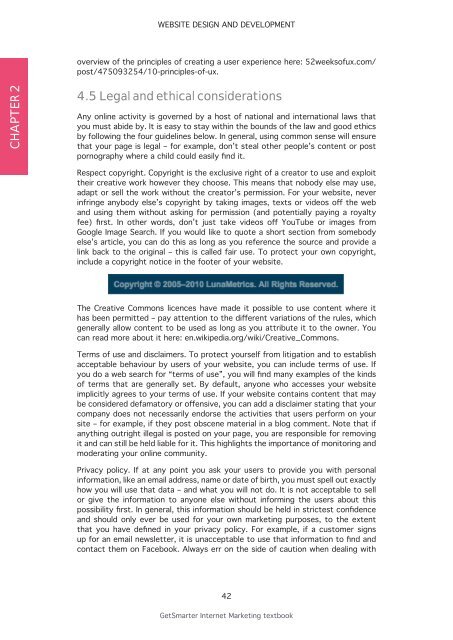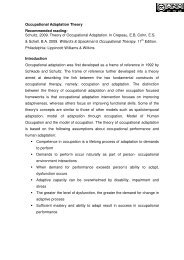Internet Marketing textbook.pdf - Vula
Internet Marketing textbook.pdf - Vula
Internet Marketing textbook.pdf - Vula
- No tags were found...
Create successful ePaper yourself
Turn your PDF publications into a flip-book with our unique Google optimized e-Paper software.
Website design and developmentoverview of the principles of creating a user experience here: 52weeksofux.com/post/475093254/10-principles-of-ux.CHAPTER 24.5 Legal and ethical considerationsAny online activity is governed by a host of national and international laws thatyou must abide by. It is easy to stay within the bounds of the law and good ethicsby following the four guidelines below. In general, using common sense will ensurethat your page is legal – for example, don’t steal other people’s content or postpornography where a child could easily find it.Respect copyright. Copyright is the exclusive right of a creator to use and exploittheir creative work however they choose. This means that nobody else may use,adapt or sell the work without the creator’s permission. For your website, neverinfringe anybody else’s copyright by taking images, texts or videos off the weband using them without asking for permission (and potentially paying a royaltyfee) first. In other words, don’t just take videos off YouTube or images fromGoogle Image Search. If you would like to quote a short section from somebodyelse’s article, you can do this as long as you reference the source and provide alink back to the original – this is called fair use. To protect your own copyright,include a copyright notice in the footer of your website.The Creative Commons licences have made it possible to use content where ithas been permitted – pay attention to the different variations of the rules, whichgenerally allow content to be used as long as you attribute it to the owner. Youcan read more about it here: en.wikipedia.org/wiki/Creative_Commons.Terms of use and disclaimers. To protect yourself from litigation and to establishacceptable behaviour by users of your website, you can include terms of use. Ifyou do a web search for “terms of use”, you will find many examples of the kindsof terms that are generally set. By default, anyone who accesses your websiteimplicitly agrees to your terms of use. If your website contains content that maybe considered defamatory or offensive, you can add a disclaimer stating that yourcompany does not necessarily endorse the activities that users perform on yoursite – for example, if they post obscene material in a blog comment. Note that ifanything outright illegal is posted on your page, you are responsible for removingit and can still be held liable for it. This highlights the importance of monitoring andmoderating your online community.Privacy policy. If at any point you ask your users to provide you with personalinformation, like an email address, name or date of birth, you must spell out exactlyhow you will use that data – and what you will not do. It is not acceptable to sellor give the information to anyone else without informing the users about thispossibility first. In general, this information should be held in strictest confidenceand should only ever be used for your own marketing purposes, to the extentthat you have defined in your privacy policy. For example, if a customer signsup for an email newsletter, it is unacceptable to use that information to find andcontact them on Facebook. Always err on the side of caution when dealing with42GetSmarter <strong>Internet</strong> <strong>Marketing</strong> <strong>textbook</strong>

















